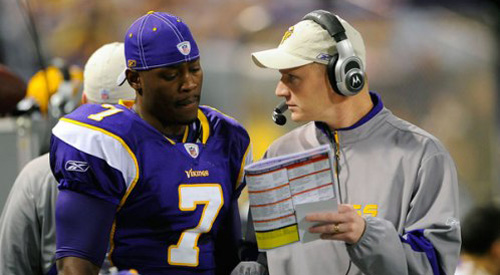
A-Viking Seattle will go: is that the best idea?
The Seattle Seahawks might have had one of the strangest offseasons in the NFL this year. Despite claiming a division championship and a home playoff victory over New Orleans, they completely remade their team. What’s even more notable than just the fact of remaking the roster was where they drew many of the new pieces from: the Minnesota Vikings, a team which went just 6-10 last season.
It’s not all that often that 6-10 teams are raided for multiple parts by playoff teams, but that didn’t stop Seattle. They’ve brought in offensive coordinator Darrell Bevell, star receiver Sidney Rice and new starting quarterback Tavaris Jackson from Minnesota, and completely remade their offense in the process.
On one hand, there are some advantages to it; the quarterback-offensive coordinator dynamic is one of the most important in football, and having a new quarterback entering a system he already knows can reduce the already-steep learning curve of joining a new team. Jackson already has to adjust to new blockers, receivers and field conditions, so keeping a similar offensive system to the one he’s previously run should make things easier.
Moreover, it’s worth pointing out that Seattle’s 2010-11 season wasn’t your average run to the divisional round of the playoffs. The Seahawks only went 7-9 last season, but managed to win the terrible NFC West. Their playoff win over the heavily-favored Saints was rather impressive, but they then went on to lose 35-24 to the Chicago Bears in the divisional round, and that score was rather favorable to the Seahawks.
[php snippet=1]
The dissonance between their regular season and playoff performances left the Seahawks’ front office with a dilemma this offseason: should they assume the larger sample size of the regular season was correct and that their team required major changes, or was their team as capable as their win over the Saints suggested and only required minor changes? They opted for the first option, and considering the context, it’s a little more understandable why Seattle decided to shake things up rather than bring back veteran quarterback Matt Hasselbeck and sticking with the status quo.
However, change as a goal in and of itself can be problematic, and it’s unclear if these moves as a whole have really improved the Seahawks. Jackson only played three games with the Vikings last season and generally couldn’t edge out the declining Brett Favre, and he wasn’t that great when he did play. He only completed 58.6 percent of his passes for 341 yards, with four interceptions and just three touchdowns. Jackson can occasionally be effective as a rushing quarterback, and he averaged nine yards per carry in 2010, but that was only on seven rushing attempts.
Moreover, it’s not like 2010 was an anomaly in an otherwise-promising career; Jackson has spent five years in the NFL, but has only completed 58.7 percent of his passes over that span and thrown just 24 touchdowns with 22 interceptions. He’s been solid at times, and he’s only 28, so it’s not like he’s at the end of his career, but it’s just worth pointing out that the Bevell-Jackson pairing didn’t lead to tons of success in Minnesota.
The Vikings did make the 2009-10 NFC Championship Game, where they lost to New Orleans, but that was with Favre under center. In fact, the main reason the Vikings appeared to bring Favre back was because they didn’t seem to have the necessary faith in Jackson. It’s not as if they fought hard to hold on to him, either; Jackson was released outright by Minnesota this year and signed with Seattle as a free agent.
There are further complications for Seattle, too. Although it’s a familiar system, Bevell’s had to make some tweaks to better incorporate the Seahawks’ personnel, and Jackson hasn’t exactly shone at picking up the new concepts thus far.
Moreover, the Seattle offensive line is still facing its typical struggles, which could make things more difficult for Jackson. He doesn’t have Adrian Peterson to hand off to any more either, and while Rice is an excellent acquisition, the rest of the Seattle receiving corps doesn’t exactly stand out.
That doesn’t mean these moves are doomed to fail. If Bevell can tweak his offensive scheme that maximizes Jackson’s strengths and minimizes his weaknesses, that could be a significant advantage for the Seahawks.
If Jackson can build on the bright spots he showed in Minnesota and reprise his chemistry with Rice, all while forming new relationships and new connections with new receivers, maybe he’ll be the next great Seattle quarterback. There are a lot of ifs in there, though, so it’s far too early to assume that it will work.
The Seahawks have made plenty of dramatic moves this offseason, led by their Minnesota-flavored overhaul, but you might not want to peg them in as repeating division champs just yet.
*The Bears also got pasted themselves by the Packers in the NFC Championship Game, so they might not be the top team to measure yourself against either.
[php snippet=1]

